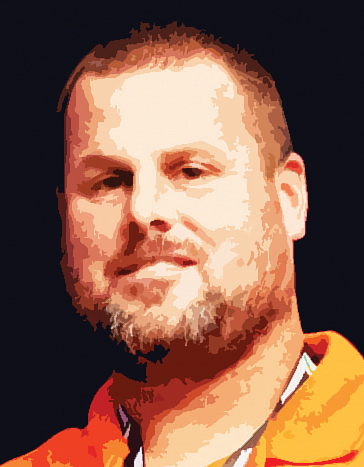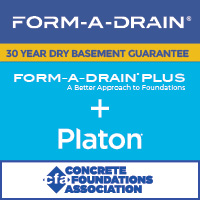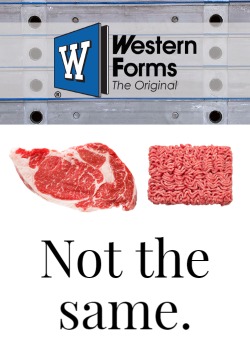NEW LEADERS START THEIR SERVICE – CFA’S 2019 BOARD OF DIRECTORS SELECTEES

The process has finally been completed for starting the 2019-20 fiscal year. As the many members of this Association realized through the many notices, an extended period of nominations and encouragement for participation was offered by the board’s president, Phillip Marone, this year.
“I wanted to take an extra moment to encourage our members to find the invitation to get involved and to be able to react to it,” states Marone. “Serving at the board level can be an intimidating decision, but everyone that has participated, even attending one of these meetings, realizes the powerful influence networking at this level has among your peers. Add the feeling of worth that comes from being part of the driving force for this great organization and you have an opportunity that really is an honor and yet remains a surprising mystery for most.”
The elections were finalized in September and have resulted in five new faces joining the board, each one beginning three-year terms. We take this opportunity to introduce them to you, giving some background information to make them more relatable, which will hopefully encourage you to also get involved. The CFA Board of Directors is largely comprised of owners or managers involved in contractor operations from across the country. You can always find the current list on our website.
Joining the board this year are two members representing new companies to the board and three who are from familiar contributors. One represents the national associate interest of suppliers and manufacturers while four represent at-large positions and contractor members. The seats they now fill have been occupied by some great leaders; Jim Bartley (Bartley Corp, 18 yrs), Kirby Justesen (SCW Footing & Foundations, 12 yrs), Mary Wilson (Michel Concrete, 8 yrs), Doug Doggett (Doggett Concrete, 6 yrs) and Chris Ward (Western Forms, 3 yrs). They are looking ahead to use their passions and ideas in new ways to continue serving and leading the Association and the industry. Each candidate responded to key questions in an article posted to Concrete Facts online (see CFA Members Nominated For Board of Directors online at Concrete Facts, September 2019). Now we turn to a little more about them as their elected service begins so that you are encouraged to meet them or communicate with them as new leaders within the Association.
SHANNON DWINNELL

Residential Services for Doggett Concrete, Charotte, North Carolina
After attending trade school in Canada, Shannon immigrated to the U.S. in 1989 and is now a proud red, white, and blue American. He became a licensed builder in the state of South Carolina and has been a licensed realtor in that state as well. Over the last 30 years of his career, he has built and sold many multi-million-dollar homes and has lived in Charleston, SC; Greenville, SC; Raleigh, NC; and Charlotte, NC
“I worked my way up from a framing and trim carpenter to project manager over the first three years. Then I spent the bulk of my early career in high-end custom home-building in the resort areas around Charleston, South Carolina, working my way up from project manager to vice president of construction at the design-build company I was employed.”
When the Recession hit in 2008, Shannon transitioned to scattered site-building with a national “on your lot” builder as a general manager. There, he worked his way up to regional vice president overseeing operations in three states. It was in this role he became introduced to Doug Doggett, a former CFA board member, and decided to take a position on the subcontracting side of the industry. Since then, he has found working with this group to be very rewarding.
“As head of the Residential Division, I get to interact with all facets of the group of companies Doug has put together. It is a rare thing to work with such a great group of talented people. We have a wonderful culture and we are growing and improving every day. I was even more amazed by the great group of businessmen and women at the CFA event in Denver this past year. You all welcomed Nelda and I so openly and with such sincerity that we knew we were in the right place in our life and career.”
Shannon is blessed to have his wife of nineteen years, Nelda, who originally emigrated from the Philippines, alongside him for this journey. They have two beautiful daughters, Nicole and Elizabeth, and have welcomed Nelda’s parents to call Charleston their home. Shannon’s parents and three siblings still reside in the great white north of Ontario, Canada.
When asked what the most memorable moment of his career has been, Shannon took a moment to think about the last 30 years of industry service. “There have been many highs (and lows) over the last 30 years,” he said. “I have been fortunate to win awards, work with a lot of great people on incredible projects, and it’s been enjoyable to share challenges with others in the industry. My two most memorable moments, though, are recent ones. The brewery tour at CFA Denver and the Charity tricycle race sponsored by Kingswood Custom Homes NC. We met a lot of great people in Denver and enjoyed the comradery of the CFA. Then, recently, five of my team members and I competed in the most fun and intensely ridiculous race while laughing out loud the whole time and raising money for good causes.”
Shannon was next asked what the most challenging project of his career has been. “I am tempted to say the next one. We are currently working on a very challenging build with one of our builders, Kingswood Custom Homes, on Lake Norman. This site is a narrow point lot with 320-degree water views. The access is basically restricted to 20 feet x 50 feet where the road ends. From here it drops off steeply in all directions. It has 46 feet of elevation change from the garage slab to the lowest level of a two-level basement. We have been breaking rock for the footings for more than 30 days and will place 260 yards of concrete and 27 tons of steel in the footing alone. The walls will contain 450 yards of concrete and 25 tons of steel while another 130 yards of concrete and two tons of steel will be wrapped up in the slabs. There is also a 50-foot infinity-edge pool along the water’s edge. The project has elevated slabs on steel deck and many mass fill areas, which we will utilize our stone shooters on.”
When asked how this type of a challenge is met, Shannon responded, “Our crews are talented tradesmen and are making it happen with tight access, which requires a lot of coordination of men and machines and multiple phases to complete one section in order to start another and stage materials and equipment for the next. Thankfully I have a great group of talented teams to rely on, and that means my greatest challenge is finding more of these jobs to showcase their abilities and keep a backlog of work in front of my project managers.”
Now turning his attention to the board and this Association, and knowing he serves as a voice for the industry, we asked Shannon what he might think is the most challenging issue facing the construction industry. “I believe there are two: Labor and Culture. Labor is the most immediately apparent [challenge]. We struggle more and more every year to find, train and retain good, skilled tradesmen. Each year the level of skill an applicant brings to the table seems to diminish, which brings me to the second [culture]. We must create a culture that encourages the more experienced trade professionals to pass on the knowledge and skills to the younger generation. We need to grow a culture that takes pride in the work they do and encourages youth to look to the trades as legitimate and fulfilling careers.”
RUSS TALPEY

Owner/President of Talpey Construction, LLC, Westbrook, Connecticut
One cannot find a better example than Russ of a contractor member who finds extreme value and opportunity in a network. He joined his company to the CFA in 2015, representing the smaller side of the contractor network served by the Association.
Russ entered the industry when he looked for a summer job while attending Rowan University. Eventually, college ended in graduation – but the job did not end. He started with flatwork in southern New Jersey. After graduation, he moved back home to Connecticut and ran into a great foundation guy, Dennis Breslin. When asked about Breslin, Talpey reflected fondly on those times. “He was the kind of guy who taught us all kinds of good stuff,” Russ said. “For instance, I was, like, 23 and watched him one day give a very ‘animated’ lecture to a structural engineer on how to read the CRSI manual. I learned then and there that I needed to know as much about the technical side of the business as I felt others already knew.”
Talpey reflected on the way Breslin started out as a homebuilder back in the 60s, and how he could not get anyone to pour a decent foundation wall. So, he did what so many builders have done and started installing his own foundations. It did not take long for other builders to begin hiring him for the quality. “Dennis would say he even did some complicated walls for other form guys because they couldn’t figure them out,” Talpey said. “The fact that he knew the whole building process going forward really showed in the details of his concrete work.”
Talpey considers the background understanding he learned from Breslin an important part of who he is today. “You just don’t see that really anymore. I don’t think Dennis ever knew about the CFA, but from what I’ve come to know in the few short years as a member, he would have really been into it.” When Talpey met Breslin, he was then 65 and nearing the end of his career but maintaining a few high-end accounts. So, Russ moved on from his education with Breslin and started his own operations. “We started with additions and small jobs during the mid-2000s. Today, I have a great line-up of builders we work for and have built a solid reputation for service and quality.” Breslin passed away in 2010 after a brief illness, and Talpey attributes some of his great high-end builder accounts today to the experiences and the reputation he gained with Breslin.
Home is important for Talpey, like it is for so many throughout the CFA network and this industry. He lives in Westbrook Connecticut with his wife of 11 years, Stefanie, though they have been together for sixteen. They have three boys, Jack (10), George (5), and Hank (1). It is a busy time for him both at work, at play, and at home. Still, success is leading him in many new directions and he now wishes to begin giving back through service. He was named the CFA’s “Kick-Start Member of the Year” in 2017 and this year is receiving the CFA’s coveted “Contractor of the Year,” (CFA’s 2019 Professional Awards, this issue). When asked about his toughest challenge from a project perspective, he immediately recognizes the Carson Landing Project named as this year’s Grand Project of the Year, The Large and the Small of It (Winter 2019).
Talpey was in attendance at Concrete Foundations Convention 2019 in Denver, Colo. this year, like many of his peers and fellow CFA members. During the event, keynote speaker and Sadler vice president, Amy Woodall, was featured for a presentation titled, “People Suck, How to Deal with Difficult People.” This was timely for him, since, reflecting on his biggest challenge(s) in business to date, Russ holds that people have proven to be the biggest challenge. “Very tough question. I’d have to say just all the people I’ve met over the last 18 years in this line of work. There certainly have been the good and the bad, much more good than bad I can say. It is a very colorful industry.”
Talpey stated in his nomination that he looked forward to an opportunity to serve the Association, knowing he is still (relatively) young and that he loves the business. “I’ll be doing this for a good while longer; I have some concerns about things I think [the] CFA could help with, and I am ready to be part of the process to address them.” Russ believes the biggest challenge(s) facing the industry today, from his perspective, include scheduling around municipal inspections. He states that some towns are great to work with and others, “not so much.” Looking a bit outside his market and personal challenges, he believes the biggest challenge for our industry in this immediate area are builders who constantly think they can get the same job done for less.
JOHN YAKOVICH

Partner at SCW Footings & Foundations, Salt Lake City, Utah
A relatively new personality in and around the CFA Board of Directors, John Yakovich is committed to serving with the same passion as the company president and multiple-term board member, Kirby Justesen. “This upcoming year,” John said, “will be my 30th year in working in various positions in construction, including concrete footings and foundations. I have worked for three different and unique companies, giving me a broad perspective of this industry.” John’s journey is not an unfamiliar story to many in this industry, and he comes ready to blend his perspective and experience with those all around the table.
John started in the industry with a small company in the early 1990s, where he learned the basics of construction and some of the details of concrete. These basics included reading blueprints, running a crew, and ordering materials for basic production homes. He credits this position as the first opportunity to meet Kirby Justesen.
“Kirby would use my company as a subcontractor on some of his footing jobs,” John said. He then joined the Carpenters Union for his second career stage, which he believes was also a great learning opportunity. Here, John experienced plywood forming for high walls, water tanks, and bridges for interstate highways. Working for a union company, he also learned about the dynamic collective bargaining groups and about managing within this labor environment. “The union gave me training in managing OSHA requirements and in providing safety, first aid, and CPR. The company also paid for three years of college education at Salt Lake Community College, where I received my journeyman certification and an academic perspective on construction work.”
John then moved into the third stage of his career: working for Kirby Justesen at the predecessor to SCW, Formco Foundations. “I have worked my way through various positions at the company,” John reflected, “starting on a crew building footings and foundation walls for some of the most complex buildings in the country.” John advanced in the company to become a crane operator for a few years, and he began managing the various issues related to access and crane limits and capacities. He then began managing the weld shop, building customized baskets and racks for the company’s forms, and redesigning and rebuilding the cranes. A promotion brought him to the position of purchasing manager, where he managed various material requisitions. Coming full circle, John has once again increased his responsibilities, now serving SCW as a project manager, overseeing small jobs and large multi-million-dollar contracts of various levels of complexity. “Currently, I oversee all aspects of the company’s projects and operations,” John said. He also recently accepted an invitation to join the company ownership as a partner.
John, every bit the family man typical of so many in this industry, expresses his passion for his family first: his wife, Karen; his daughters, Scarlett (27), Tina (26), and Hemi (14); his son-in-law, Trevor (Tina’s husband); his two step sons, Tyler (29) and Jaden (24); and Jaden’s wife, Amber. His pride also extends to one grandchild, James (8 mos). “I feel I have a lot of support from my family as well as my partners at SCW – Kirby Justesen, Tim Jenson, Dave Sheppard and Nate Bennett. We have so many great employees who are supportive to SCW’s success.”
John is a contractor through and though, and you can sense his passion for the industry when he talks about projects and experiences. When asked about the most memorable moments, he said it was the first time he poured self-consolidating concrete (SCC) using a Symons steel-ply forming system. “The foundation had a two-inch decorative rock form liner with a modern window design. There was only enough room for the steel beam and rebar between the windows and no space to pump it traditionally,” John said.
After consulting with the ready-mix company and making calls to the form manufacturer regarding head pressure concerns, the team decided SCC was the best option to control the pour. However, they also decided they could not place it the traditional way from the top, due to all the constrictions, and instead they opted to mount pump connections to the forms and pump the mix in from the bottom of the wall up to the windows. They then came back to finish from the top, filling in the remaining volume above the windows.
“Everything was looking great. We were just finishing off the top of the wall when a brand new four-inch filler broke at the bottom of the wall.” John said they were about six feet from the street, up in the foothills. “We lost about 10 yards down the street that traveled about 200 feet, and about 20 yards emptied inside the hole [foundation].” With the hard work of the crew, contractor, salesman, pump operator, and even the concrete tester, they were able to clean everything up, rebuild the decorative wall, and repour by 3 a.m. that night.
The most memorable experiences – yet also the most challenging projects – John has faced can be attributed to building at ski resorts like Powder Mountain at 9,000 feet in elevation. “The challenges on these projects are not just the design but also the limited crane access, shorter summers or inclement weather, steep climbs, long travel times, and the sourcing materials.”
John intends to use his experience overcoming challenges like these, along with his vast experience in company operations, to impact his tenure on the CFA board. “I feel the biggest challenge in our industry is recruiting skilled workers. The construction industry has steadily increased and remains heavily dependent on manual labor. Even with the advances in technology, we are all facing the challenge of an aging workforce.”
ANDY RENNER

Vice President at Bartley Corp, Silver Spring, Maryland
Renner has been in and around the CFA for several years, demonstrating his passion for the industry and Association as well as his desire to play a role and do his part in leadership. This has started with his commitment to certification with the ACI/CFA Residential Foundation Technician Certification and continues on now into board service.
“I’m glad to have the opportunity to work with the board and look forward to working hard to bring new ideas to the industry,” Andy said. Andy has not only been around the CFA for several years, but he has a career built on concrete construction and can speak to the challenges faced and conquests attained serving in a variety of capacities. He entered the industry in 1985 with Star Concrete and Foundations of Ashburn, Va. and worked there until 1990. “I started off not knowing anything about concrete and within the first year had become a foreman of a footing and wall crew,” Renner recalled.
Then, in August of 1990, he was given the opportunity to join Bartley Corp of Silver Springs, Md., where he began as a general laborer. By November of that year, he had become a footing foreman. In March of 1991, he advanced to a footing and wall foreman, and a year later he advanced again to the position of general wall foreman, where he remained for about ten years. In August of 2001, Renner became the commercial division field manager. He then returned to the residential side of the business as residential project manager, which was more in line with his passion, in March of 2006. “Here,” John noted, “I did mostly high-end homes with about five million (USD) in sales.” This led Renner on a path toward more corporate level management where, in November of 2015, he advanced to being project coordinator of residential housing and then the following year he became general manager of the residential division. Today, Renner is a vice president at Bartley Corp, where he continues to oversee the entire residential division.
Renner echoes the family values of his peers and speaks with fondness of the impact his family has had on his life. He is married to Dawn, his wife of 23 years, and is proud of her 25 years in business as a hairdresser. Together, they have two children. Aaron (21) is a senior at Shepherd University in Shepherdstown, W.Va. where he is on pace to graduate with a Bachelor of Science degree in computer science and is a member of the Theta Xi. Amber (16) is a sophomore in the honors program at Washington High School in Charles Town, West Virginia where she is involved in tennis, color guard, band, and 4H. Andy joked that if they could create an 8-day-per-week calendar, Amber would find something else to get into.
Renner is a hard worker and describes the work he has completed with fondness. When asked about the most memorable moment of his career, he was quick to describe the time when he was a project manager and achieved an $8 million-dollar year. “Six-point-five million of that was doing foundations for a production builder on just two different projects,” Renner said. “While supported by a great team, I was single-handedly challenged with the management of it, and it was completed within the quality context we are known for.”
In addition to mentioning this accomplishment, Renner described the most challenging project he has faced. He said it was when he had to put in a foundation that was 80 feet above the Potomac River. “We were around 10 feet from the edge of the cliff. Before we put the footings in, we had to dig out all the loose rock and dump over 700 yards of concrete. By the time this was done, we were then working only four to six feet off the cliff’s edge. We had to put up a safety fence, as one wrong move could not be in our plan.”
In bringing his experience to the table and reflecting on what he sees in the workplace, Renner shared his opinion on what the biggest challenge facing the industry is: “Safety – trying to get all the employees to be as efficient as possible and attack all jobs with safety on the crew’s mind at all times.”
HAL CASSIDY

National Sales Manager for Prinsco|PROFORM HD, Willmar, Minnesota
Hal Cassidy has been actively seeking to join the CFA Board of Directors for the last several years. He has been aligned with the interests of the Association and has become increasingly involved with the leaders of this industry at events such as the Concrete Foundations Convention. He has continually offered his service, ready to roll up his sleeves and find more ways to inspire, educate, and advocate for the residential concrete industry and CFA membership. “I want to continue to learn more about the industry,” Hal said, “finding more of its opportunities, identifying and solving its challenges, and providing creative input to help advance the organization and its members.”
Hal started with a finance background and spent almost ten years in banking and accounting. He took a Sales Administration position with ADS where he held responsibilities for pricing, analysis, custom products, promotions, etc. Following a path of traditional career advancement, that position led to a Sales Manager role in National Accounts and then ultimately into a GM role with Operations and Sales for the Midwest. Following an acquisition and structure changes, he moved back into the Sales Manager/National Accounts where he continues today, leading Residential sales for Prinsco and furthering the development of foundation products like PROFORM HD.
Cassidy presently lives in northwest Ohio and has pretty much his entire life. Hal is married to his wife Cyndi of 33 years. They have two kids and three grandchildren, “we enjoy spending a lot of time with.” When asked what he likes to do when he’s not working, Hal responded, “if I’m not working or spending time with family, I enjoy fishing for walleye on Lake Erie with good friends.”
Cassidy joins the board as one of the three National Associate seats maintained for the suppliers and manufacturers that innovate this industry. He brings nearly 30 years’ experience of service to the drainage industry. He believes that drainage itself is a very critical component to delivering a high-quality and long-lasting foundation. When Hal was asked about how he sees himself fitting in with the board’s group dynamic, he said, “I believe I am a highly creative individual, one who likes to think outside the box. I know that sounds cliché in today’s world, but I believe in it and the necessity to challenge others to do the same.”
These five passionate new board members join an experienced and professional representation of both CFA membership and the vitality of this industry. You can find the complete list of Board members, their locations and their terms online at www.cfaconcretepros.org under the About menu. The CFA Board of Directors meets four times per year, with one of those meetings happening at the annual Concrete Foundations Convention (Charleston, S.C. 2020) and another happening at the World of Concrete in Las Vegas, Nevada. Two additional meetings are held each spring and fall in concert with the American Concrete Institute’s conventions in order to facilitate greater participation and advocacy in the areas of codes and standards development for the industry with contractor representation.
For more information on serving on the CFA Board of Directors, please contact the CFA’s executive director, James Baty, at jbaty@cfaconcretepros.org or 319-895-6940. For more information on becoming a member of the Concrete Foundations Association, visit the Association’s website, www.cfaconcretepros.org as well.









